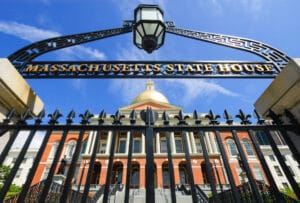A controversial proposal to let 10 towns and cities in Massachusetts ban natural gas from new developments has made it into the final version of the state’s latest piece of climate legislation, but in a revised form that exempts labs and adds new housing production requirements.
House and Senate negotiators announced the conference committee bill last night shortly before 8 p.m.
“Massachusetts needs to open up huge new resources of green electric power if it’s to stay on course for reducing emissions. Today’s compromise aims to ramp up clean power, especially offshore wind but also solar, storage and networked geothermal, and run it through cars, trucks, buses and buildings, the biggest source of emissions in the state,” state Sen. Mike Barrett and state Rep. Jeffrey Roy said in a statement.
After two months spent negotiating, the state House of Representatives is poised to pass the compromise bill, H.5060, today.
“Tomorrow, we will act again on this issue by passing a bill that bolsters clean energy production, while creating thousands of jobs in the process,” House Speaker Ron Mariano tweeted last night.
The original version of the 10-community gas ban passed by the Senate would have let a small slice of communities ban natural gas hook-ups in new construction as quickly as 120 days from the bill’s passage. Commercial real estate trade group NAIOP-MA identified the communities most likely to enact such bans in an email to its members last week as:
- Cambridge
- Newton
- Brookline
- Lexington
- Arlington
- Concord
- Lincoln
- Acton
- Aquinnah
- West Tisbury
NAIOP and other trade groups criticized the Senate’s first version of the ban as an immediate threat to housing production, saying the changes would force some projects in the pipeline back to the drawing board and increase costs to build in these highly desirable communities that have histories of keeping development out.
The new version of the ban exempts lab buildings and requires any town applying to have reached “safe harbor” from the state’s Chapter 40B affordable housing law by having a state-approved housing production plan or having at least 10 percent of its homes dedicated as affordable housing units. Alternately, a town could put in place a zoning district “of reasonable size” that allows multifamily developments by-right in line at a density of at least 15 units per acre – roughly comparable to a neighborhood of three-deckers. In each case, a community would have 18 months from the bill’s passage to hit the benchmark.
Only 10 towns will be allowed to take part in the program at any one time, and the state Department of Housing and Community Development will have to collect and report out a range of data about the program’s impact, including on housing affordability.
“NAIOP is pleased the legislature recognized the technical challenges fossil fuel bans present for the building and maintenance of lab and medical facilities,” NAIOP-MA CEO Tamara Small said in an emailed statement. “This sector of our economy is vital to the continued economic growth of the commonwealth. However, one of the biggest barriers to attracting investment in Massachusetts is the lack of workforce housing. While we appreciate the language that requires affordability thresholds or minimum multifamily zoning requirements, middle-income housing is also desperately needed. We remain concerned that the proposed fossil fuel bans could hinder the production of housing and dissuade investment, threatening our economic future.”
Of the 10 communities NAIOP identified earlier this month, only Newton and Arlington do not currently meet the bill’s criteria.







